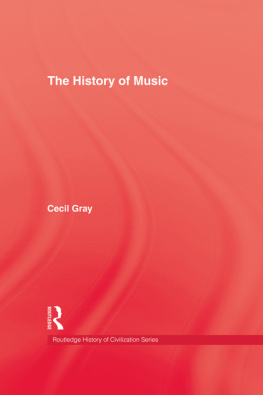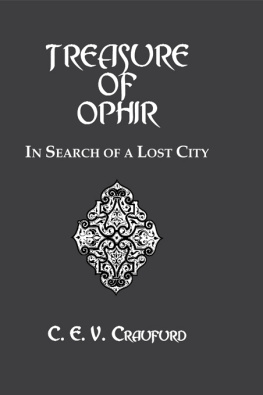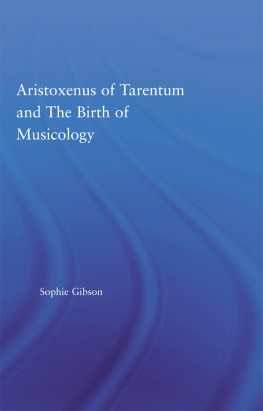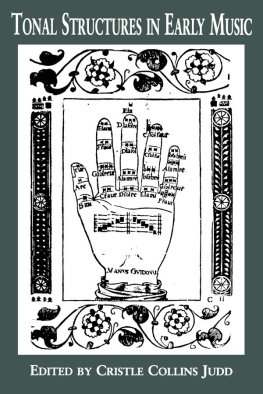Cecil Gray - The History Of Music
Here you can read online Cecil Gray - The History Of Music full text of the book (entire story) in english for free. Download pdf and epub, get meaning, cover and reviews about this ebook. year: 2013, publisher: Taylor and Francis, genre: Art. Description of the work, (preface) as well as reviews are available. Best literature library LitArk.com created for fans of good reading and offers a wide selection of genres:
Romance novel
Science fiction
Adventure
Detective
Science
History
Home and family
Prose
Art
Politics
Computer
Non-fiction
Religion
Business
Children
Humor
Choose a favorite category and find really read worthwhile books. Enjoy immersion in the world of imagination, feel the emotions of the characters or learn something new for yourself, make an fascinating discovery.
- Book:The History Of Music
- Author:
- Publisher:Taylor and Francis
- Genre:
- Year:2013
- Rating:3 / 5
- Favourites:Add to favourites
- Your mark:
- 60
- 1
- 2
- 3
- 4
- 5
The History Of Music: summary, description and annotation
We offer to read an annotation, description, summary or preface (depends on what the author of the book "The History Of Music" wrote himself). If you haven't found the necessary information about the book — write in the comments, we will try to find it.
The History Of Music — read online for free the complete book (whole text) full work
Below is the text of the book, divided by pages. System saving the place of the last page read, allows you to conveniently read the book "The History Of Music" online for free, without having to search again every time where you left off. Put a bookmark, and you can go to the page where you finished reading at any time.
Font size:
Interval:
Bookmark:

THE HISTORY OF MUSIC
By far the most stimulating and complete introduction to the styles and schools of Western music, this work is certain to remain a classic. Beginning with the music of the early Christian church, the Gregorian chant, the book proceeds through minstrels and troubadours, the Flemish polyphonic schools, the Italian Renaissance, the Viennese school and the Russian school. Music lovers will appreciate the authors sound interpretations and engaging, readable style.
THE HISTORY OF MUSIC
CECIL GRAY

First published in 2004 by
Kegan Paul International Ltd
This edition first published in 2009 by
Routledge
2 Park Square, Milton Park, Abingdon, Oxon, OX14 4RN
Simultaneously published in the USA and Canada
by Routledge
270 Madison Avenue, New York, NY 10016
Routledge is an imprint of the Taylor & Francis Group, an informa business
Kegan Paul, 2004
Transferred to Digital Printing 2009
All rights reserved. No part of this book may be reprinted or reproduced or utilised in any form or by any electronic, mechanical, or other means, now known or hereafter invented, including photocopying and recording, or in any information storage or retrieval system, without permission in writing from the publishers.
British Library Cataloguing in Publication Data
A catalogue record for this book is available from the British Library
ISBN 10: 0-710-30867-1 (hbk)
ISBN 13: 978-0-710-30867-2 (hbk)
Publishers Note
The publisher has gone to great lengths to ensure the quality of this reprint but points out that some imperfections in the original copies may be apparent. The publisher has made every effort to contact original copyright holders and would welcome correspondence from those they have been unable to trace.
CONTENTS
PREFACE
H ISTORIES of music generally belong to one or other of two definite categories : either they are elementary text-books primarily designed for educational purposes, or else they are so scientific in method and technical in language as to be virtually unintelligible to any one except a highly trained musician. So many reliable works of both kinds are already in existence that to add to their number would be a work of supererogation ; on the other hand, there would seem to be a distinct need for a survey of the entire field of musical history intended for the average, intelligent music-lover rather than for the student, and for the general, cultured reading public rather than for the professional musician. No apology then, is needed for the present modest attempt to supply this deficiency. It aims at striking a mean between the abstruse and the elementary, the scientific and the educational ; consequently musical illustrations have been dispensed with, technical terms are only employed when it proved impossible to avoid them, and biographical information, which occupies such a disproportionate amount of space in most works of this kind, has been entirely eliminated save for the occasional citation of relevant facts which help to shed light upon some particular aspect of a composers work. At the same time, the reader is presumed to be already acquainted with the bare rudiments of music, and to have a rough general knowledge of the most important events and personalities in musical history. Finally an attempt has been made to study the art of music, not as a thing apart, but in relation to other human activities and to life generally, as befits a volume belonging to a series entitled The History of Civilization.
The criticism is often made that such an undertaking is beyond the scope of a single volume and cannot possibly be satisfactorily accomplished by a single writer, but this is only partially true. As Mr. G. K. Chesterton has said somewhere, even if one sets out to write the religious history of East Rutlandshire in a large number of volumes, one will inevitably be compelled, sooner or later, to select ones material and to reject a great deal that seems to be of secondary importance ; similarly an absolutely complete and exhaustive history of music is no more possible in a hundred volumes than in one. It is equally true that no one man can hope to be acquainted with every piece of music that has been written, or even to be an authority on every period. The present writer, indeed, makes no claim to be regarded as an authority on any period whatsoever, but this is not necessarily altogether a disadvantage. In some ways it is even a positive advantage, for the period-specialist is notoriously unreliable and lacking in a sense of proportion when he comes to consider the part in relation to the whole, and his own particular period in relation to other periods. He cannot see the wood for the trees, in fact, and the main defect of the many otherwise admirable histories of music in which a number of specialists on different subjects and epochs collaborate, consists in the fact that no clear conception of the whole emerges from the vast accumulations of data which they bring together. For in the history of art as much as in any other branch of historical research, facts are meaningless until interpreted, and the function of the musical historian is, or should be, as different from that of the period-specialist as the function of the philosopher is from that of the chemists, physicists, biologists, anthropologists, and other scientists who provide him with his material. His concern, in short, is not with the discovery of facts, but with their interpretation, and the revelation of their intrinsic significance. This is all that the present writer has attempted in the following pages, and if his conclusions should sometimes seem to differ strikingly from those arrived at by most historians, it will generally be found to be on points on which authoritative opinion is itself perplexed and divided, or where some purely sthetic issue is involved. There is no statement of fact in the following pages in support of which the opinion of at least one of the most eminent modern authorities cannot be adduced.
C.G.
London, April, 1928.
THE HISTORY OF MUSIC
INTRODUCTION
I F, in contradiction of the Preacher, there is anything on the earth of which it could be said, See, this is new, it is surely that which we are accustomed to call the historical sense. The ability to identify ourselves momentarily with some bygone or otherwise unfamiliar mode of thought, the swift, intuitive sympathy which ignores all temporal limitations, the magic carpet of the spirit which transcends all geographical and racial frontiers, is the Danaan gift of the twentieth century, unknown to any other, and perhaps its most valuable contribution to human thought and sensibility. In earlier times we invariably find a narrow and intolerant attitude towards any form of art or mode of life which differed widely from their own ; every age consistently regarded itself as the unalterable, procrustean standard by which everything must be judged and measured, and the art of all its predecessors had to be adapted, edited, restored, or otherwise defaced, before it could be accepted. To-day, on the contrary, our aim is rather to preserve the element of strangeness, unfamiliarity, and even uncouthness, of a primitive or exotic work of art ; indeed, it is often precisely this aspect of it that affords us the greatest pleasure. History and archaeology are no longer ghoulish, necrophilistic activities, as formerly ; their object is not to analyse and dissect the past, but rather to make it live again. As Michelet wrote at the beginning of his monumental and epoch-making history of France, Ihistoire est une rsurrection.
Next pageFont size:
Interval:
Bookmark:
Similar books «The History Of Music»
Look at similar books to The History Of Music. We have selected literature similar in name and meaning in the hope of providing readers with more options to find new, interesting, not yet read works.
Discussion, reviews of the book The History Of Music and just readers' own opinions. Leave your comments, write what you think about the work, its meaning or the main characters. Specify what exactly you liked and what you didn't like, and why you think so.







